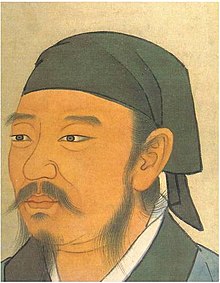
Back زونزي Arabic زونزى ARZ Xun Zi AST Syun-Tszı Azerbaijani ཞུན་ཙི། Tibetan Xun Zi Breton Xunzi Catalan شون کوانگ (شونزی) CKB Sün-c’ Czech Сюнь-цзы CV
 Imaginary portrait of Xunzi, Qing dynasty (1636–1912), Palace Museum | |
| Born | c. 310 BCE |
| Died | After c. 238 BCE (aged mid 70s) |
| Era | Hundred Schools of Thought (Ancient philosophy) |
| Region | Chinese philosophy |
| School | Confucianism |
| Notable students | Han Fei, Li Si |
Main interests | Ritual (Li), Human nature, Education, Music, Heaven, Dao, Rectification of names |
| Xunzi | |||||||||||||||||||||||||||||||||
|---|---|---|---|---|---|---|---|---|---|---|---|---|---|---|---|---|---|---|---|---|---|---|---|---|---|---|---|---|---|---|---|---|---|
| Chinese | 荀況 | ||||||||||||||||||||||||||||||||
| |||||||||||||||||||||||||||||||||
| Alternative Chinese name | |||||||||||||||||||||||||||||||||
| Traditional Chinese | 荀子 | ||||||||||||||||||||||||||||||||
| Simplified Chinese | 荀子 | ||||||||||||||||||||||||||||||||
| |||||||||||||||||||||||||||||||||
Xunzi (Chinese: 荀子, lit. 'Master Xun'; c. 310 – c. after 238 BCE), born Xun Kuang (Chinese: 荀況), was a Chinese philosopher of Confucianism during the late Warring States period. After his predecessors Confucius and Mencius, Xunzi is often ranked as the third great Confucian philosopher of antiquity. By his time, Confucianism had suffered considerable criticism from Daoist and Mohist thinkers, and Xunzi is traditionally regarded as a synthesizer of these traditions with earlier Confucian thought. The result was a thorough and cohesive revision of Confucianism, which was crucial to the philosophy's ability to flourish in the Han dynasty and throughout the later history of East Asia.[1] His works were compiled in the eponymous Xunzi, and survive in excellent condition. Unlike other ancient compilations, his authorship of these texts is generally secure, though it is likely that Western Han dynasty historian Liu Xiang organized them into their present form centuries after Xunzi's death.[2]
Born in the State of Zhao, Xunzi studied at the prestigious Jixia Academy, where he learned about every major philosophical tradition of his time. After his graduation, Xunzi traveled to Chu where he mastered poetry, and then returned to Qi as a highly regarded teacher at the academy. His students Han Fei and Li Si each had important political and academic careers, though some of their Legalist sentiments were at odds with his philosophy. Other students such as Fuqiu Bo, Zhang Cang and Mao Heng authored important editions and commentaries on the Confucian classics.[3] Later in his life, Xunzi served in the court of Lord Chunshen and died sometime after Lord Chunshen's death. The constant warfare of his time informed his work profoundly, as did his interactions with leaders and witnessing the downfall of various states.
Xunzi's writings respond to dozens of other thinkers, whom he often directly names and criticizes. His well-known notion that "Human nature is evil" has led many commentators to place him opposite of Mencius, who believed human nature was intrinsically good. Though like Mencius, Xunzi believed that education and ritual were the key to self-cultivation and thus the method to circumvent one's naturally foul nature.[4] His definition of both concepts was loose, and he encouraged lifelong education and applied ritual to every aspect of life. Other important topics include the promotion of music and the careful application of names. Though he still cited the ancient sages, he differed from other Confucian philosophers by his insistence on emulating recent rulers rather than those of long ago.[4]
Repeated oversimplifications and misunderstandings on Xunzi's teachings, particularly his view on human nature, led to gradual dismissal and condemnation of his thought from the Tang dynasty onwards. By the rise of Neo-Confucianism in the 10th century, Mencius gradually upended Xunzi, particularly by the choice to include the Mencius in the Four Books.[5] Since the 20th century, a reevaluation of Xunzi's doctrine has taken place in East Asia, leading to recognition of his profound impact and relevance to both his times and present day.[6]
- ^ Britannica 2017, § para. 1.
- ^ Goldin 2018, §1 "Xunzi and Xunzi".
- ^ Goldin 1999, p. xii.
- ^ a b Cheng 2016, § "Confucius and Disciples".
- ^ Britannica 2017, § para. 13.
- ^ Goldin 2018, §9 "Xunzi’s Reception after His Death".